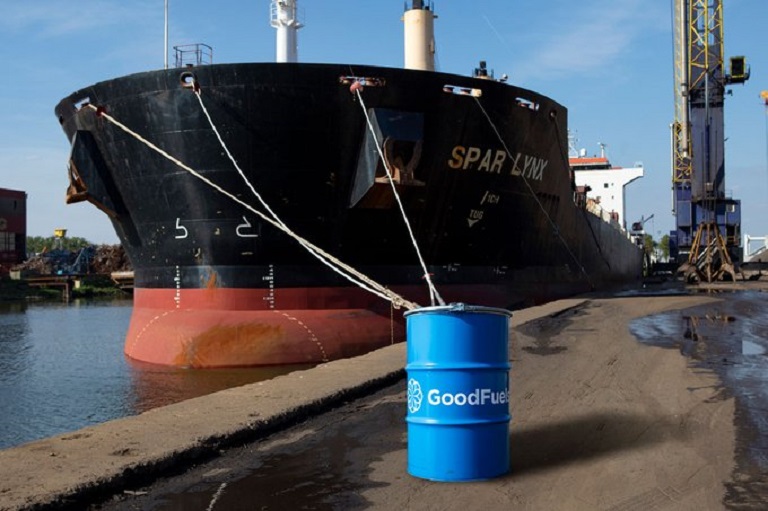A 10-day trial onboard a Spar Shipping AS bulk carrier enabled a reduction of at least 75% in carbon and sulphur emissions, and further confirms technical viability of GoodFuels’ sustainable marine biofuel

Long-term dry bulk tonnage provider Spar Shipping AS, ship management leader Fleet Management Limited and global biofuels supplier GoodFuels have today announced that they have successfully completed a 10-day trial of 100% sustainable marine biofuel on board Spar Shipping AS’ bulk carrier Spar Lynx.
Spar Lynx was refuelled with GoodFuels’ biofuel during its port stay in Dordrecht, in the Netherlands, before sailing to the port of Icdas, in Turkey. The next-generation sustainable biofuel was derived from a variety of feedstocks certified as 100% waste or residue, including processed used cooking oil and animal waste fats.
The trial was the first bio-bunkering undertaken by Spar Shipping AS and its ship management partner, Fleet Management Limited. The sustainable marine biofuel supplied by GoodFuels delivers a reduction of at least 75% in well-to-exhaust carbon dioxide (CO2) emissions. Over the voyage, Spar Lynx saw a 85% cut in sulphur oxides (SOx) emissions when compared to traditional fossil-based marine fuels. Analysis and continuous monitoring by Fleet Management Ltd using a NOx (nitrogen dioxide and nitric oxide) meter supplied by GoodFuels showed the NOx emissions did not increase at a higher speed when using biofuel, contrary to some industry assumptions.
The trial also further confirmed the safety and technical viability of biofuels for the future fuel mix. Ahead of the trial, Fleet Management Limited undertook a full inspection of the Spar Lynx’s engine to compare the vessel before and after sailing. Following the voyage, no particulates or differences in engine performance were recorded, which demonstrates biofuel’s ability to seamlessly “drop in” to existing vessels, requiring no changes to existing tanks or engines.
Jarle Ellefsen, Managing Director at Spar Shipping AS said: “There is particular industry attention on the suitability and applicability of biofuels to legacy tonnage. With regards to Supramax and Ultramax tonnage, which Spar Shipping AS represents, we consider biofuels may well be the only viable sustainable solution for modern tonnage as well. As a tonnage provider, we are looking to facilitate and make feasible sustainable solutions that are technically as well as economically viable. It is all about providing added flexibility to the charterers or operators of existing tonnage.”
Mr Ellefsen added: “Sustainability is also about affordability, and part of the picture is to enable the biofuels industry to scale up and secure both availability as well as low-cost sustainable biofuel alternatives for the maritime industry. The sustainable biofuels industry needs takers to be able to scale up, and the maritime industry is looking for availability and low cost. To this end, we all have a role to play. By doing our homework, we de-risk, and we are ready and in position to offer new sustainable alternative solutions once the regulatory framework allows for it. We have no time to lose if we are to fulfil the expectations placed upon us by the many stakeholders within our industry.”
Dirk Kronemeijer, CEO of GoodFuels, said: “As a market leader and pioneer, we are proud to supply our sustainable biofuel to Spar Shipping AS as a credible sustainable solution which can match their operational needs. The results from this latest trial further demonstrate the important role of biofuels as a drop-in solution which is available today and makes a tremendous and immediate difference on greenhouse gas emissions. The time for action on shipping’s decarbonisation is now, and we are proud to partner with Spar Shipping AS and Fleet Management Limited as they join the ranks of our marine biofuel pioneers committed to sustainability.”
Commenting on the trial, Kishore Rajvanshy, Managing Director at Fleet Management Limited said: “Environmental stewardship is a key area of our Caravel Group and Fleet Management sustainability strategy. We are very pleased that this trial demonstrated a significant reduction in both carbon dioxide and sulphur oxides compared with conventional fuels. As the world’s second largest ship management company – with more than 600 vessels under our care – we look forward to further contributing to the exploration of the use of biofuels within the global shipping industry.”